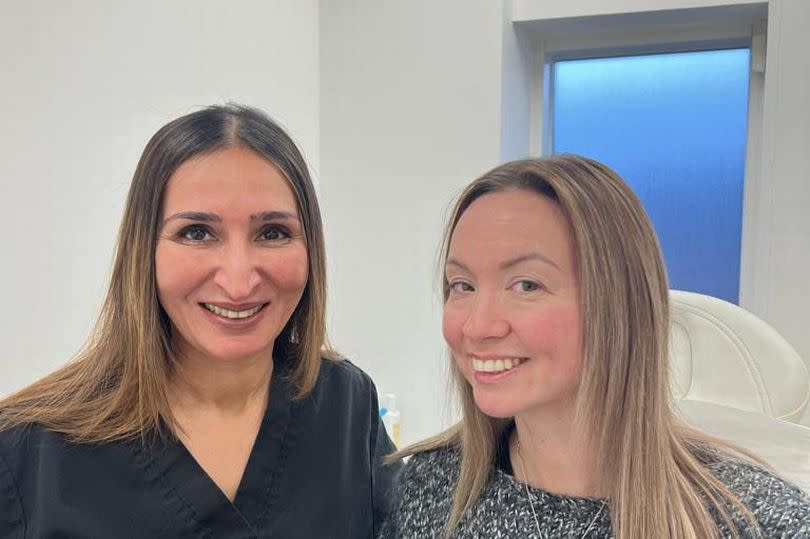'Mystery vagina pain was so bad I couldn't play with my toddler': Hidden health condition blights 3% of women
Despite campaigns attempting to break the taboo of gynaecological health issues, many of us are embarrassed talking to our doctors and even our friends about problems “down there”.
So it’s little wonder that many women suffering from the little-known condition lichen sclerosus (LS) aren’t seeking help. LS causes itchy white patches on the vulva and anus, and predominantly affects older women, although children and men can also suffer. Between 1-3% of UK women have the condition, but experts estimate the true prevalence is higher, because of under-recognition and under-reporting.
“Many people haven’t heard of LS,” says Dr Charlotte Cassis, an NHS consultant obstetrician and gynaecologist. “As with so many female health issues, women don’t feel comfortable talking about things they feel are ‘embarrassing’ – such as itchy genitals. We all spend lots of time looking after our facial skin, and yet tend to neglect our vulval skin,” she adds.
“What’s more, lichen sclerosus has been associated with permanent scarring, increased problems urinating and having sex, psychological distress and a general decreased quality of life. It’s a lifelong condition.”

If you think you might have symptoms, don’t allow shame or shyness to stop you from seeking help. When something is impacting on your daily activities, sex life or self-esteem, it’s crucial to be open with your GP.
Dr Shirin Lakhani, an intimate health and cosmetic doctor, also stresses the importance of getting help. “Left untreated, LS can destroy the architecture of the vulva, causing fusion of the tissue. The clitoris can become completely buried in the hood, while midline fusion can affect the vaginal opening, making sex difficult, or even impossible. Awareness of LS must be raised, to enable those who need help to be able to access it.
“Women shouldn’t suffer in silence,” she adds. “Treatments are available and the quicker these are sought, the better the outcome.”
‘Our relationship has struggled as our sex life is affected’
Amy Ford, 33, is an airport passenger service assistant and lives in Essex with her fiancé and their daughter, two

“My symptoms began a year ago, when using tampons became painful. Then I noticed big, white, itchy patches. Terrified it was cancer, I called the GP who diagnosed thrush.
Thrush treatments didn’t help so I was referred to a consultant who diagnosed lichen sclerosus and prescribed steroid cream. I didn’t feel the steroids were particularly effective and the skin around my vulva became red raw, and the white patches went from my inner to my outer lips.
I was in constant pain, crying before work. Day-to-day activities like playing with my daughter were impossible due to my sore skin. I stopped socialising and sex became painful. My fiancé has been supportive, but our relationship has struggled as our sex life is affected.
Feeling dismissed by the NHS, I turned to a Facebook group for support. There I came across Dr Lakhani, and I’m now exploring alternative therapies. I’m not expecting a miracle cure, but I’m hopeful my symptoms will improve.
I want to raise awareness about this condition, so if my daughter suffers from it in the future, there will be more help available to her.”
Understanding lichen sclerosus
Know the signs
White, scaly, itchy patches are usually the first signs. “The sore skin feels like it’s going to tear easily, making sex or urinating painful,” explains Dr Cassis.
“But itching in the vulval area can be caused by many things,” she continues, which can account for LS being misdiagnosed.
LS is less common in younger people, Dr Cassis explains, so doctors are more likely to suspect thrush or infections. And postmenopause, vulval atrophy (a thinning of the skin or dryness due to the lack of oestrogen) might be wrongly blamed instead.

Why do people get LS?
“The exact cause is unknown but it’s thought to be an autoimmune condition,” says Dr Cassis. There may also be a hereditary element, she adds, as around 10% of those affected have a family member with LS. “The fact it’s usually found in postmenopausal women suggests hormones are involved, and trauma is also thought to be a triggering factor, such as sexual abuse or surgical trauma.”
Dr Lakhani stresses that LS is not an infection. “It’s therefore not contagious and can’t be passed on from a partner,” she says.
See your GP
“The longer LS goes untreated, the more the disease and symptoms progress,” says Dr Cassis. If your doctor rules out more common culprits, they can refer you to a specialist. Then, if LS is diagnosed, your response to treatment, usually topical steroids, will be monitored.
If necessary, a vulva biopsy will be carried out in a gynaecology clinic. “LS carries a slightly increased lifetime risk of developing vulva cancer, so sufferers need regular check-ups,” explains Dr Cassis.
Can lifestyle changes help?
“Your lifestyle can’t cause LS, but to stop it worsening, simple measures include avoiding friction and irritation,” says Dr Cassis. She advises washing with warm (not hot) water, patting (not rubbing) skin dry, using emollient on tight skin, and avoiding perfumed soaps, feminine wipes, harsh washing detergents, and synthetic underwear.
If sex is painful, Dr Cassis recommends vaginal dilators and lubricants, as well as “taking the focus away from penetrative sex while the area is healing”.

What can be done to help?
“While there is no ‘cure’, LS can be well managed and progression of the disease halted,” says Dr Cassis. “Treatment with potent topical corticosteroids suppresses itching and pain in 75-90% of patients.”
Alternatively, in Dr Lakhani’s private clinic, she offers therapies such as PRP injections (using patients’ own blood to regenerate skin), which have had some great results, she says. “In some cases symptoms are greatly reduced and the use of topical steroids are drastically reduced.”
For support try sruk.co.uk. If you’re interested in alternative therapies, visit Dr Lakhani’s website at elite-aesthetics.co.uk


